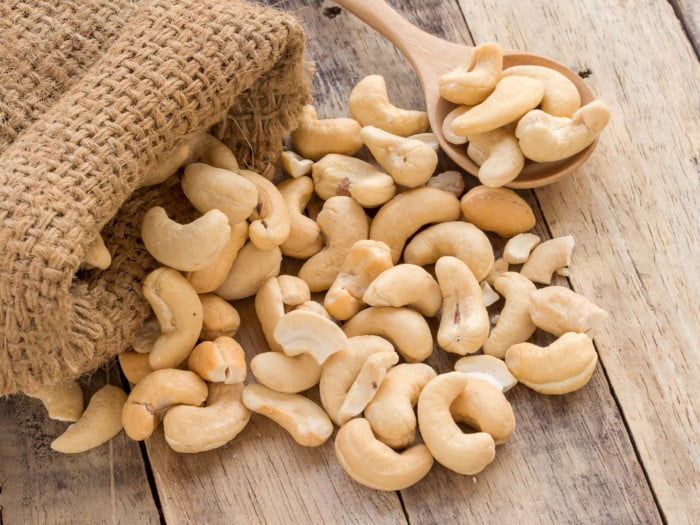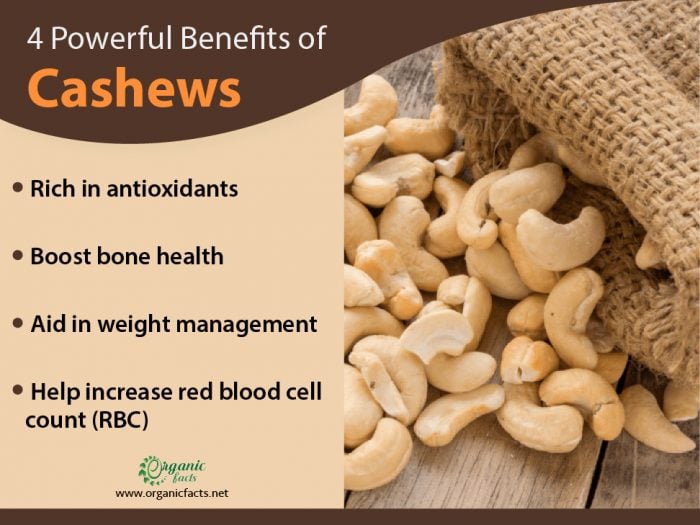The powerful health benefits of cashews may include a healthy heart, strong nerve and muscle function, and improved bone and oral health. They also provide relief from diabetes, anemia, and gallstones. By offering an antioxidant defense, they also encourage a better immune system.
What are Cashews?
Cashews are rich in nutrients. They belong to the family of Anacardiaceae, which includes mangoes and pistachios. Cashews are originally native to the coastal areas of north-eastern Brazil. They are kidney-shaped seeds widely cultivated in tropical climates. Cashews are typically grown in countries like India, Sri Lanka, Kenya, and Tanzania. The nuts are found at the bottom of the fruit known as a cashew apple, and have diverse uses, particularly in Brazil, Asia, and Africa. [1]
Cashews Nutrition Facts
Cashews are good for you as they are a powerhouse of proteins and essential minerals, including copper, calcium, magnesium, iron, phosphorus, potassium, and zinc. Sodium is also present in very small quantities. According to the USDA cashews also contain vitamin C, B- vitamins, thiamin, riboflavin, niacin), folate, and vitamin E (alpha-tocopherol), and vitamin K (phylloquinone). They are a source of oleic acid and provide a good quantity of monounsaturated fat and low amounts of polyunsaturated fats with no total cholesterol content when consumed in moderation. An ounce of cashew contains 157 calories and about 9 gm of carbohydrates. [2]
| Serving Size : | |
|---|---|
| Nutrient | Value |
| Water [g] | 5.2 |
| Energy | 553 |
| Energy [kJ] | 2314 |
| Protein [g] | 18.22 |
| Total lipid (fat) [g] | 43.85 |
| Ash [g] | 2.54 |
| Carbohydrate, by difference [g] | 30.19 |
| Fiber, total dietary [g] | 3.3 |
| Sugars, total including NLEA [g] | 5.91 |
| Sucrose [g] | 5.81 |
| Glucose (dextrose) [g] | 0.05 |
| Fructose [g] | 0.05 |
| Starch [g] | 23.49 |
| Calcium, Ca [mg] | 37 |
| Iron, Fe [mg] | 6.68 |
| Magnesium, Mg [mg] | 292 |
| Phosphorus, P [mg] | 593 |
| Potassium, K [mg] | 660 |
| Sodium, Na [mg] | 12 |
| Zinc, Zn [mg] | 5.78 |
| Copper, Cu [mg] | 2.2 |
| Manganese, Mn [mg] | 1.66 |
| Selenium, Se [µg] | 19.9 |
| Vitamin C, total ascorbic acid [mg] | 0.5 |
| Thiamin [mg] | 0.42 |
| Riboflavin [mg] | 0.06 |
| Niacin [mg] | 1.06 |
| Pantothenic acid [mg] | 0.86 |
| Vitamin B-6 [mg] | 0.42 |
| Folate, total [µg] | 25 |
| Folate, food [µg] | 25 |
| Folate, DFE [µg] | 25 |
| Lutein + zeaxanthin [µg] | 22 |
| Vitamin E (alpha-tocopherol) [mg] | 0.9 |
| Tocopherol, beta [mg] | 0.03 |
| Tocopherol, gamma [mg] | 5.31 |
| Tocopherol, delta [mg] | 0.36 |
| Tocotrienol, beta [mg] | 0.1 |
| Tocotrienol, gamma [mg] | 0.2 |
| Vitamin K (phylloquinone) [µg] | 34.1 |
| Fatty acids, total saturated [g] | 7.78 |
| 8:0 [g] | 0.02 |
| 10:0 [g] | 0.02 |
| 12:0 [g] | 0.02 |
| 14:0 [g] | 0.02 |
| 16:0 [g] | 3.92 |
| 17:0 [g] | 0.05 |
| 18:0 [g] | 3.22 |
| 20:0 [g] | 0.27 |
| 22:0 [g] | 0.17 |
| 24:0 [g] | 0.1 |
| Fatty acids, total monounsaturated [g] | 23.8 |
| 16:1 [g] | 0.14 |
| 18:1 [g] | 23.52 |
| 20:1 [g] | 0.14 |
| Fatty acids, total polyunsaturated [g] | 7.85 |
| 18:2 [g] | 7.78 |
| 18:3 [g] | 0.06 |
| Campesterol [mg] | 9 |
| Beta-sitosterol [mg] | 113 |
| Tryptophan [g] | 0.29 |
| Threonine [g] | 0.69 |
| Isoleucine [g] | 0.79 |
| Leucine [g] | 1.47 |
| Lysine [g] | 0.93 |
| Methionine [g] | 0.36 |
| Cystine [g] | 0.39 |
| Phenylalanine [g] | 0.95 |
| Tyrosine [g] | 0.51 |
| Valine [g] | 1.09 |
| Arginine [g] | 2.12 |
| Histidine [g] | 0.46 |
| Alanine [g] | 0.84 |
| Aspartic acid [g] | 1.8 |
| Glutamic acid [g] | 4.51 |
| Glycine [g] | 0.94 |
| Proline [g] | 0.81 |
| Serine [g] | 1.08 |
| Sources include : USDA [3] | |
Health Benefits of Cashews
The health benefits of cashews are incredible! Here are just a few of the reasons why you should add them to your diet:
May Keep Heart Healthy
Cashews are known to be a good source of healthy dietary fats, which are essential for our body to absorb the fat-soluble vitamins (vitamin A, D, E, and K) and produce fatty acids that are vital for the development of the brain and blood clotting. These healthy fats include monounsaturated fats (MUFA) and polyunsaturated fats (PUFA). They are good for the heart and help reduce bad cholesterol (LDL cholesterol) if consumed in appropriate amounts, even in diabetics. [4] [5] [6]
LDL cholesterol can rise as a result of excessive consumption of saturated fats, posing a major threat to people suffering from cardiovascular diseases like atherosclerosis (aka hardening of arteries). Studies have demonstrated that choosing unsaturated fats over saturated fats enhances the levels of HDL cholesterol, reduces triglyceride levels, and beneficially lowers blood pressure as well. The inclusion of nuts such as cashews, fish, and vegetable oils like olive oil and canola oil in the diet can provide these healthy unsaturated fats to the body. [7] [8]
May Make Your Muscles and Nerves Healthier
Cashews are a good source of magnesium, which is vital for the healthy development of bones, muscles, tissues, and the body’s organs. Magnesium may help maintain blood pressure, boost immunity, maintain nerve function, and keep the bones strong. It also may be involved in metabolic functions and helps regulate the blood sugar levels of the body (via insulin activity). A deficiency of magnesium can alter the metabolism of calcium and the hormones responsible for its regulation. [9] [10]
May Aid in Managing Diabetes
Cashews possibly contain very low amounts of sugar, and no harmful cholesterol, making them safe for people with diabetes. However, only 4-5 cashew nuts are recommended per day by nutritionists. [11]

Cashews are rich in protein. Photo Credit: Shutterstock
May Promote Formation of RBC
Cashews are rich in copper, which may help in the metabolism of iron, aiding in the formation of red blood cells (RBC), and helping to keep the bones and immune system healthy. It can also be vital for the nervous and skeletal systems of the body. A deficiency of copper in the body may result in osteoporosis, irregular heartbeats, and anemia. [12]
May Boost Bone & Oral Health
Cashews provide phosphorus, which can be essential for the healthy development of teeth and bones. Phosphorus may also aid in protein synthesis, absorption of carbohydrates and fats, and the maintenance of cellular health. [13] [14]
May Reduce Risk of Anemia
Cashews are known to be a source of dietary iron which is known to be vital for carrying oxygen around the body and aids in the functioning of enzymes and the immune system. A deficiency of iron in the diet can lead to fatigue, anemia, and increased susceptibility to infections. [15]
May Prevent Gallstones
Gallstones are stone-like deposits that usually consist of cholesterol, which accumulates in the gallbladder. Risk factors include age, weight, and any gastrointestinal issues. Regular inclusion of healthy nuts like cashews can help lower the risk of the formation of gallstones. [16] [17]
May Boost Immune System
Cashews contain zinc, which plays a vital role in the strengthening of the immune system against microbial infections, and the healing of wounds. It can be extremely important during pregnancy for the growth of the baby and the developmental years of childhood to maintain a healthy body. [18]

Cashew nuts have a rich buttery flavor with a hint of sweetness.
How To Eat Cashews?
Cashew nuts have a rich buttery flavor with a hint of sweetness. They can be enjoyed either roasted or plain, and with or without salt. They make a healthy snack. Cashews are a popular ingredient in a range of foods like curries, cookies, biscuits, and ice cream. Cashews are also used to make creamy vegan sauces and vegan milk. Each ounce of cashews contains around 160 calories, so it’s best to limit yourself to a handful (16-18 nuts) a day.
You can roast the nuts for a delicious snack. Alternatively, you can use them in the following ways:
- A vegan and paleo-friendly Raw Vanilla Cheesecake with cashew cream filling
- In a delicious Sheer Khurma Recipe with a nutty flavor
- As a coating for Crispy Cauliflower Wings.
- In an Indo-Chinese Dragon Chicken Recipe with broken cashew nuts
Side Effects of Cashews
Let us look at the side effects of excessive cashew consumption.
- Kidney atones: Cashews contain oxalate salts, which interfere with the absorption of calcium in the body. The accumulated calcium can result in the formation of kidney stones. Research conducted on this topic concluded that people who are prone to develop kidney stones should consider eating only small to moderate amounts of cashew nuts. [19] [20]
- Cashew allergy: Despite several health benefits, they can be dangerous for those who are allergic to tree nuts. It is informative to know that along with the changing national standards in food manufacturing, handling, and processing practices, such allergies also vary for different regions or countries. [21]
- Allergic reactions caused by tree nuts such as cashews, walnuts, and pistachios can be mild or severe. It is advisable to consult a doctor if one develops any allergies after consuming cashews. [22]
- Anaphylaxis: Anaphylaxis is a fast progressive allergic reaction that can happen to the whole body due to some substance or chemical to which the body has developed sensitivity. It is most commonly triggered by food allergies. As demonstrated by various research studies, cashew nuts can pose a high risk of anaphylaxis. It can lead to symptoms like noisy breathing, unconsciousness, pale appearance, swelling of the tongue or throat, and hoarseness in the voice. Anaphylaxis is a medical emergency and should be given the utmost attention. [23] [24] [25] [26]
If you have an allergy, be aware of the following:
- Contact dermatitis: Contact dermatitis is an itchy skin ailment that occurs when the skin comes in contact with an allergen. Hives and swelling can develop around the mouth or other parts that have come in contact with the nuts or their shells. The anacardic acid present in cashews is also the reason for the vesication of the cashew nut shell liquid and can lead to acute skin rashes and allergies. [27]
- Gastrointestinal discomfort: Some people might experience nausea, diarrhea, abdominal cramping, coughing, and vomiting if they have an allergy to cashews.
- Breathing difficulties: A runny nose, coughing, and shortness of breath can occur if you have a cashew allergy. More severe reactions can result in a fatal condition like glottic edema or anaphylaxis. [28]
Barring a few exceptions, cashews are a healthy option to be included in the diet. If consumed in appropriate quantities, they can help maintain a robust and steady state of health. Nuts can stand as a good alternative to compensate for essential nutrients, particularly in those who are vegetarian, vegan, or avoid meat products. [29]
